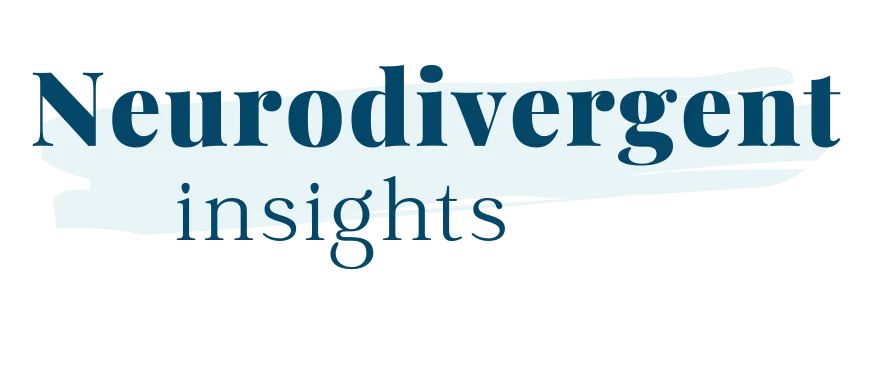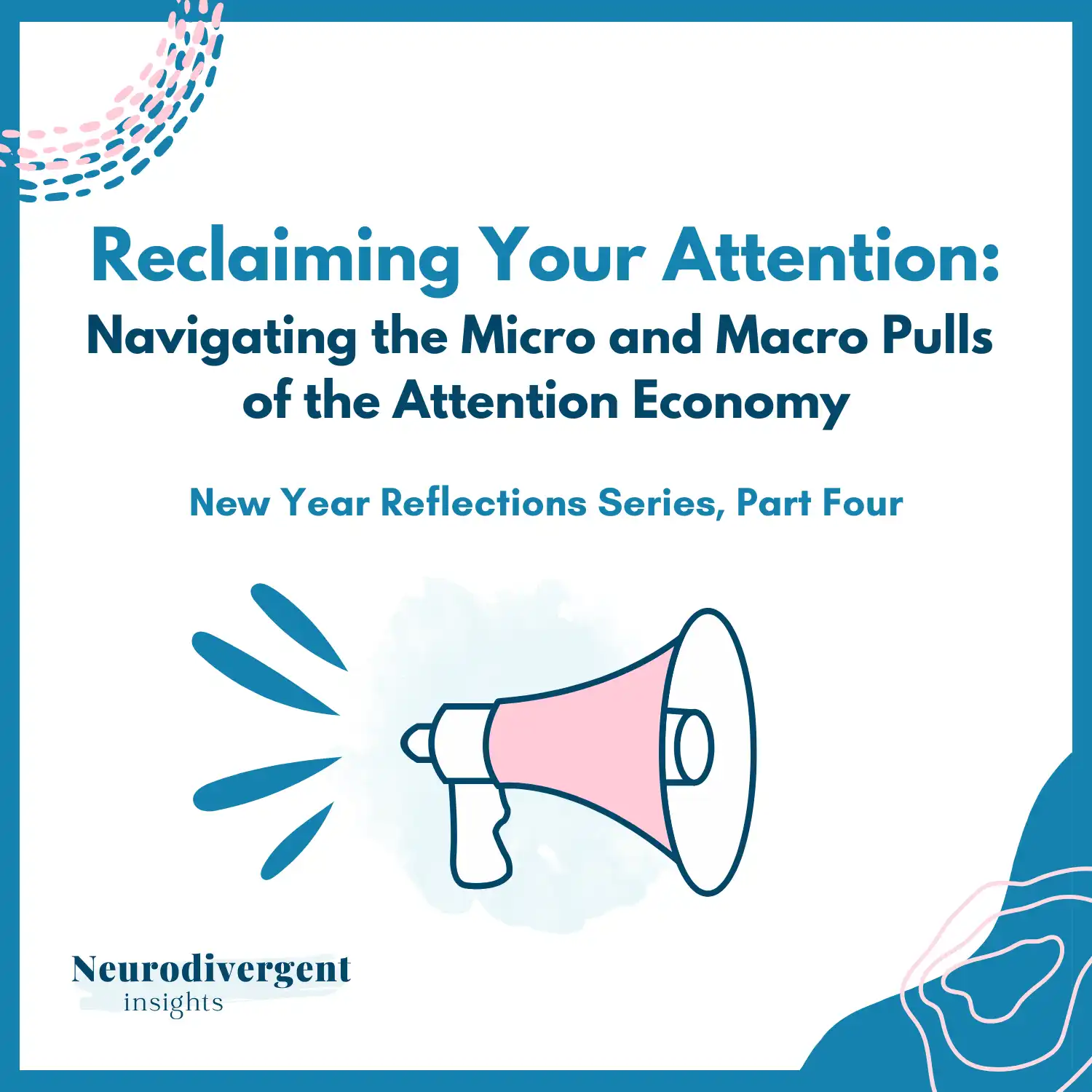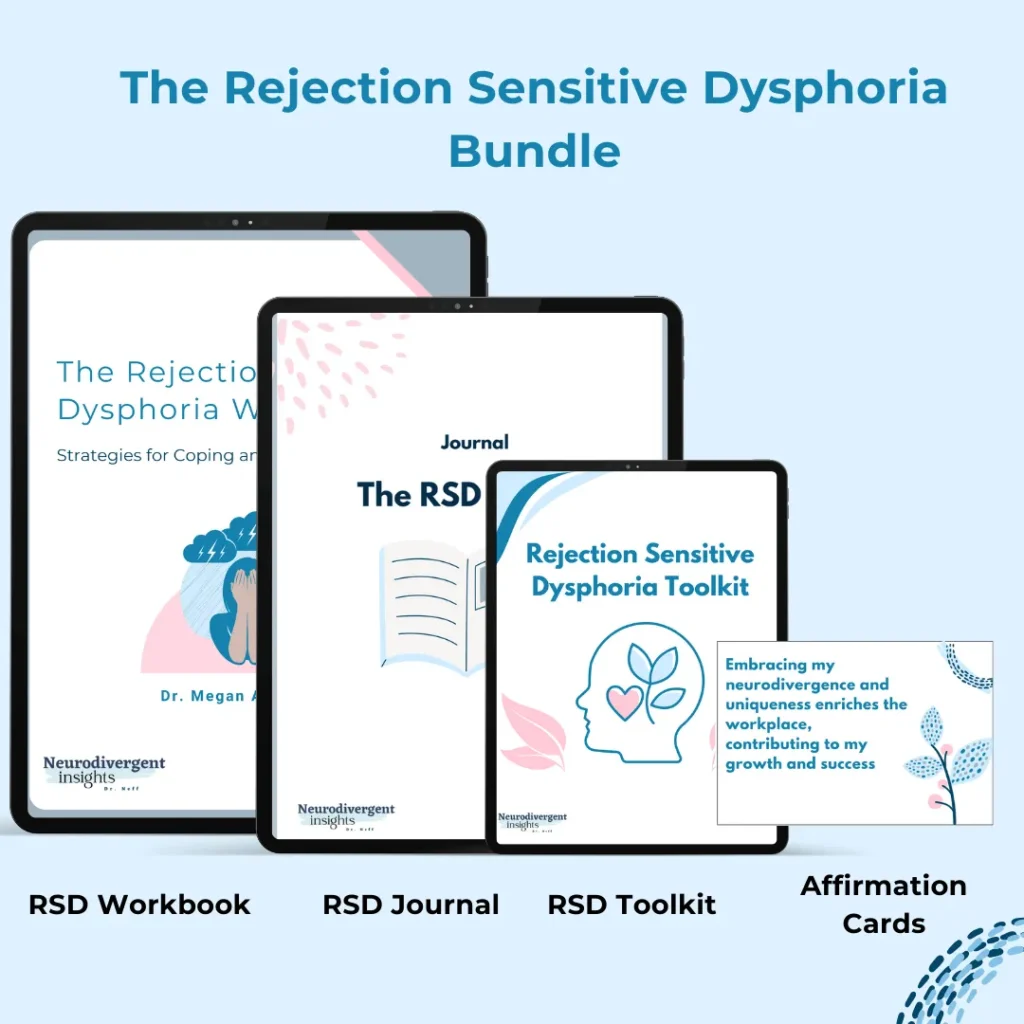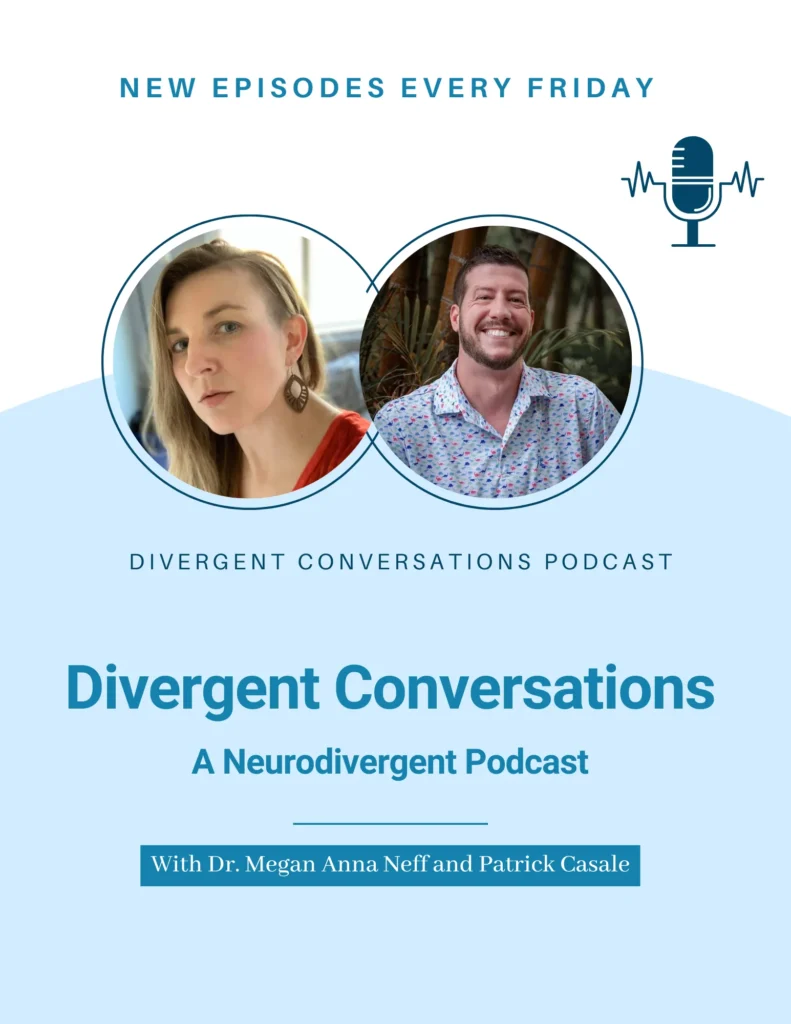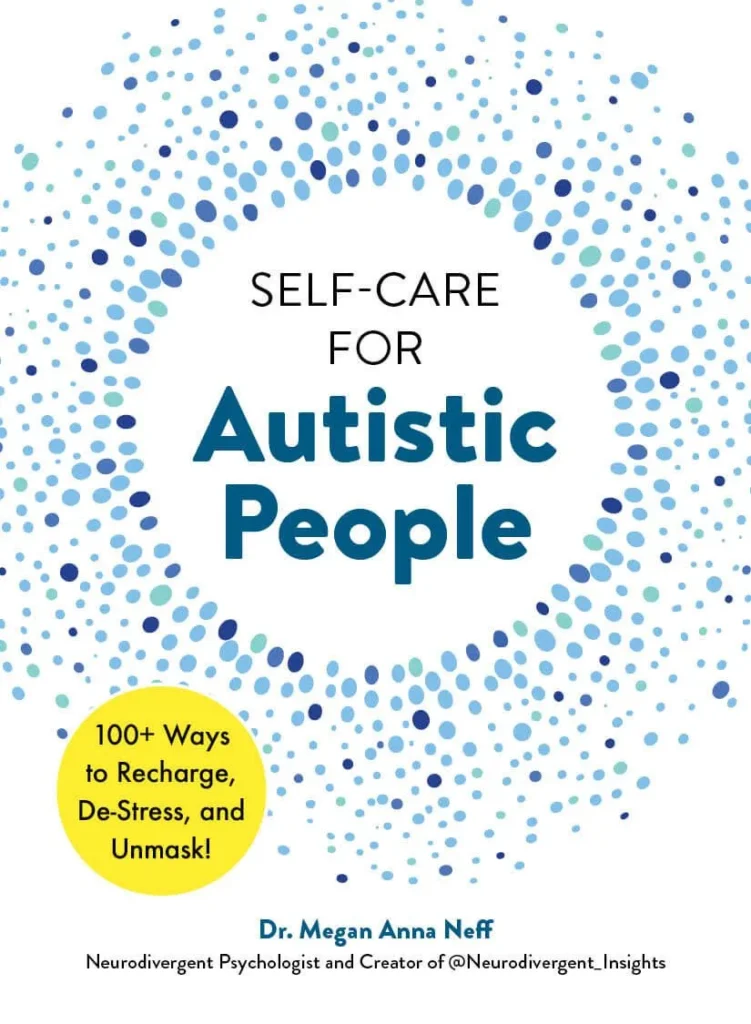
As we head into September, many ADHD and Autistic young adults are heading off to university. Transitioning from adolescence to university is a big transition for every young adult, and this is particularly challenging for many ADHDers and Autists.
ADHD, Autism, and College Statistics
The harsh reality is that ADHDers and Autistic people take longer to complete college and drop out at higher rates than their non-disabled peers (Richmand et al., 2014; White et al., 2016).
Approximately 59% of non-disabled students who enroll in a 4-year college will graduate with a Bachelor’s degree, while only 41% of disabled individuals (including Autism and ADHD) graduate (Newman et al., 2011 as quoted in White et al., 2016).
Neurodivergent college students experience many difficulties related to executive functioning challenges. Executive functioning disabilities are still largely under-supported in many colleges. As more neurodivergent students are heading off to university, many colleges are scrambling to figure out how to best support this group of students.
While there is still much work for universities to do to catch up, here are some strategies individuals and families can do to help create a smoother transition.
Why is the College Transition so Difficult?
Before looking at the specific ways to support the university transition, let’s first look at some of the factors contributing to this difficult transition.
I spent a year working in a college counseling center (note this was before COVID). It struck me how difficult the transition to college was for many students. Many were filled with anxiety, stress, self-doubt, and angst. It also struck me that it seemed students were struggling much more than I remembered from my college days all the way back in the early 2000s. It made me curious about what had changed in the last 15 years.
It turns out quite a bit has changed. By and large, gone are the days of children walking or biking to school or playing independently. Similarly, adolescents reach adult “rites of passage” later and later.
In 2017 a study in the journal of Child Development described how adolescents are increasingly “postponing adult activities.” They found that activities that serve as a right of passage happened later. Adolescents in the U.S are driving, dating, working, drinking, and having their first sexual contact later and later. Now, of course, some of these are positive things! The researcher’s observation was less evaluative (good/bad) and more observational. They observed that adolescents reach independence and independent milestones later, which has implications for the transition to adulthood.
We’ve created a structure where reaching independence is not as necessary. As Child Psychiatrist Dan Siegel has commented, it makes sense that adolescents would rewire and “remodel” their brains to adapt to modern society (original quote here). Siegel suggests modern society (with its focus on higher education and internships) doesn’t necessitate independence until the late 20s for many young adults.
Keep in mind that this study was done before COVID. COVID has undoubtedly caused a further decline in these areas as adolescents have had less freedom and have been deprived of several key experiences.
The point of sharing this information is not to shame adolescents or parents for these cultural trends. (And as an aside, I believe it is important to mention that there are other things they are doing earlier, like social justice initiatives and political involvement). The point of sharing the above information is to provide context to help understand why the college transition is so difficult for many young adults.
Overall, college students enter college with fewer life experiences that would prepare them for the independence of college life. It’s like taking an intro to a swimming course and then being thrown into the deep end of the pool. And many young adults struggle with the initial adjustment.
College, Transitions, and Neurodivergent Students
College is a season of transition and adjustment. When a person goes off to college, they are not just making one transition; they are making hundreds of transitions all at once. Here are just a few of the transitions many college students experience:
The transition from adolescence to young adulthood (and the responsibilities that come with it)
Transitioning in their maintenance of basic life skills (making their medical appointments, doing their laundry, managing their schedule, figuring out FAFSA and other financial documents)
The transition of friendship and movement toward more independent socializing
Transition to academic life and expectations of college
These adjustments to academic, social, and organizational demands are difficult for many students. And this is exaggerated and particularly true for ADHD and Autistic young adults.
The transition to college involves A LOT of executive functioning (something we tend to struggle with). And there are even more tasks placed on the ADHD or Autistic person (from managing medication and prescriptions to sorting out accommodations).
Building a support network before taking the plunge to college can help ease the transition. Ideally, a parent, mentor, or school counselor can help with some logistics of building the support network. Arranging a support network that includes medical and school professionals eases the student’s burden of navigating hundreds of changes simultaneously.
If I could give one piece of advice for ADHDers and Autistic people heading off to college, it would be this:
Be Proactive, not reactive.
Don’t wait until you are in crisis. I see this happen all the time. And it makes sense. There are so many incoming demands that it’s easy to forgo all the planning it takes to set you up for success. Ideally, you have a trusted adult (parent, high school counselor, mentor) who can help you think through and set up some of the external structures that will set you up for success.
Tips for Neurodivergent College Students
While there are many practices that support ADHD and Autistic college students, here are two that stand out to me as important (scroll down for ADHD and Autistic specific considerations).
Tip Number One: Build a Network of Professional Support
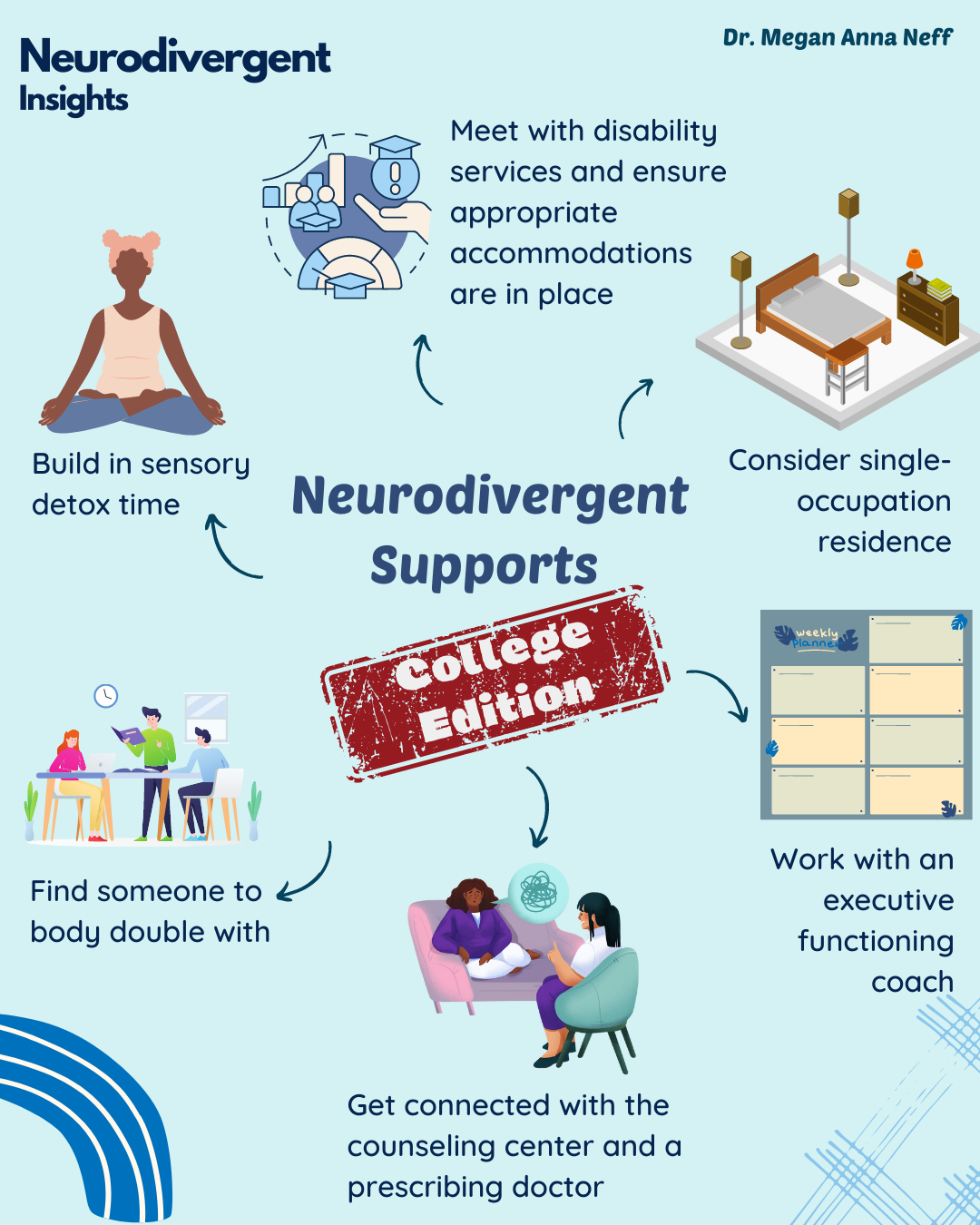
Building a support network (and starting this process early) will help build scaffolding and safety nets. When building a support network, I think of a three-legged support system:
1) Disabilities and Accessibility services
2) Medical professionals and counselors
3) Executive Functioning Supports
Disabilities and Accessibility Services
Meet with Disabilities and Accessibility Services ASAP
All schools have a designated office for disability services and accommodations. I often see students avoid reaching out to disability services; however, having appropriate accommodations in place protects from burnout, which will positively impact your mental health (and grades!).
They may also be able to connect you with executive functioning supports (if this exists at your school). Again, don’t wait until you are in crisis or burnout before seeking accommodations. Be proactive (not reactive) with this one!
Some students struggle because they don’t know what accommodations to ask for. Ideally, your school will be able to help you create a plan of accommodations that work for you. If not, check out the JANS website (Autism accommodations; ADHD accommodations). They provide helpful accommodations listed by need (scroll down to the bottom of the page). Note this is intended for employment situations; however, many of the accommodations listed here are also helpful in educational settings. In addition to accommodation ideas, they list several useful strategies and apps depending on support needs.
Medical Professionals and Counseling
Get connected with a medical provider: Whether it’s for medication management, health conditions, or just to establish with a primary care doctor, it’s good to establish with a medical provider early.
For many, this will be through your college’s health services. Students staying in the same state may be able to continue working with their home doctor. Others will need to go out into their new community to find a provider. Thanks to the increasee in mobile providers like ZoomCare, it is easier to do this online.
Why is this important? On average, ADHDers and Autists have more co-occurring health conditions, and many use prescriptions for managing depression, anxiety, and ADHD focus issues. So, getting connected early and not waiting until it is urgent is a proactive way of building your support network. This is also a time that many people are transitioning from pediatricians to primary care doctors, so it’s a natural time to establish with a new provider (one of those adult rites of passage moments!).
Counseling and Therapy
Get connected with the counseling center: Many universities have a robust health center and counseling center. Therapy is often free or a part of your student fee/health insurance.
College is a time of self-discovery, identity exploration, and more. Many college students experience anxiety, depression, homesickness, and stress during the college transition. ADHD and Autistic college students are even more prone to experiencing mood symptoms during a life transition. So figure out how to get connected to your counseling center proactively. (If you google counseling center plus the name of your college, you should find their website, email, and/or phone number).
Counseling centers often fill quickly, so getting connected before you are in crisis is helpful. Many stressors come with starting college as a Neurodivergent person. Following are things that counselors can help with:
Stress Management: Managing the stress of an increased workload, navigating new friendships, and all the transitions of college.
Executive Functioning Support: Depending on their therapeutic approach/modality, some therapists will help you with executive functioning. Some campuses have executive functioning groups or executive functioning coaching.
Ask about Groups. Many college counseling centers run groups. Increasingly campuses are running neurodivergent groups, so you can always ask about this. Additionally, many campuses run LGBTQIA groups and affinity groups.
Executive Functioning Support
Consider working with an executive functioning coach and/or ask your college accessibility services if the college provides executive functioning coaching or groups.
Both ADHDers and Autistic people struggle with executive functioning. Executive functioning is an umbrella term that involves several different skills, such as:
problem-solving
planning and organizing large tasks
time-management
the ability to initiate tasks
emotional regulation
self-restraint
Many of us benefit from learning skills to help with executive functioning. Skills such as: how to create a schedule, how to break down large projects into smaller tasks, how to organize our projects, how to manage big emotions, and how to motivate ourselves to get started on big projects. You can read more about executive functioning and my favorite items to support executive functioning over here.
Why Does Executive Functioning Support Matter?
One dissertation study compared three groups of Autistic individuals (those who graduated college (those who had graduated, were still in college, and had dropped out). They found executive functioning struggles correlated with those who dropped out vs. graduated.
Until recently, colleges haven’t been aware of how significantly executive functioning challenges impact many of their students. While many colleges are incorporating new supports, this is still an under-supported area of need.
If your accessibility services and counseling center don’t provide executive functioning coaching or support, here are a few things to consider:
First, be sure and ask your disabilities services if they do! It’s possible they do, but you likely won’t know unless you ask. Even if the answer is no, if enough students ask about this, they will learn this is an area of need/interest.
Ask the counseling service if they offer executive functioning support or have therapists who can help with these strategies. Depending on the theoretical approach of the therapist, many provide support around executive functioning.
If you strike out on the above two, consider working with an executive functioning or ADHD coach (many are available to work with you online through zoom and other formats).
Ideally, you will be able to get connected to executive functioning supports through your university. However, if your school does not offer these supports, you may consider working with an ADHD or executive functioning coach. Coaches are readily available online. You can find them through directories such as the CHADD directory (ADHD coaching) or a company like New Frontiers (Autism).
Tip Number Two: Build in Sensory Detox Time
Create Sensory Downtime
Sensory differences and sensitivities are common among both ADHDers and Autistic people. We tend to take in the world with heightened sensitivity (or hyposensitivity). College is a high-sensory experience with lots of moving bodies, loud dormitories, crowded cafeterias, and more. As such, scheduling downtime is critical for avoiding meltdowns, sensory overload, and burnout.
Find a place you love to study. For some, this may be a quiet corner in the library (I spent A LOT of time in my college library).
For others who need stimulation to study, it may be going to a coffee shop with noise-canceling headphones and sitting in a corner while listening to your favorite music.
Finding nature near your campus and regularly go on walks or runs.
Creating a sensory detox space in your dorm room
If you have some budget to spend on dorm room furniture, the following are some of my favorite sensory detox items.
Create a Sensory Soothing Dorm Room
The Moon Pod. This one is a bit pricey and costs more than your average bean bag chair. It also feels much different than your average bean bag chair. Personally, my favorite thing to do when I need a sensory reset is to lay in my moon pod with a weighted blanket on top of me while listening to my favorite song on repeat.
Consider alternative lighting. Some college dorms are still using fluorescent lighting. Bringing in lamps or twinkle lights can provide a gentler way of lighting your room.
A sound machine. There can be a lot of incoming sounds when living in close corners with others. So a sound machine such as this one which provides brown, white, and pink noise, can be helpful for studying, downtime and sleep.
ADHD Specific Considerations
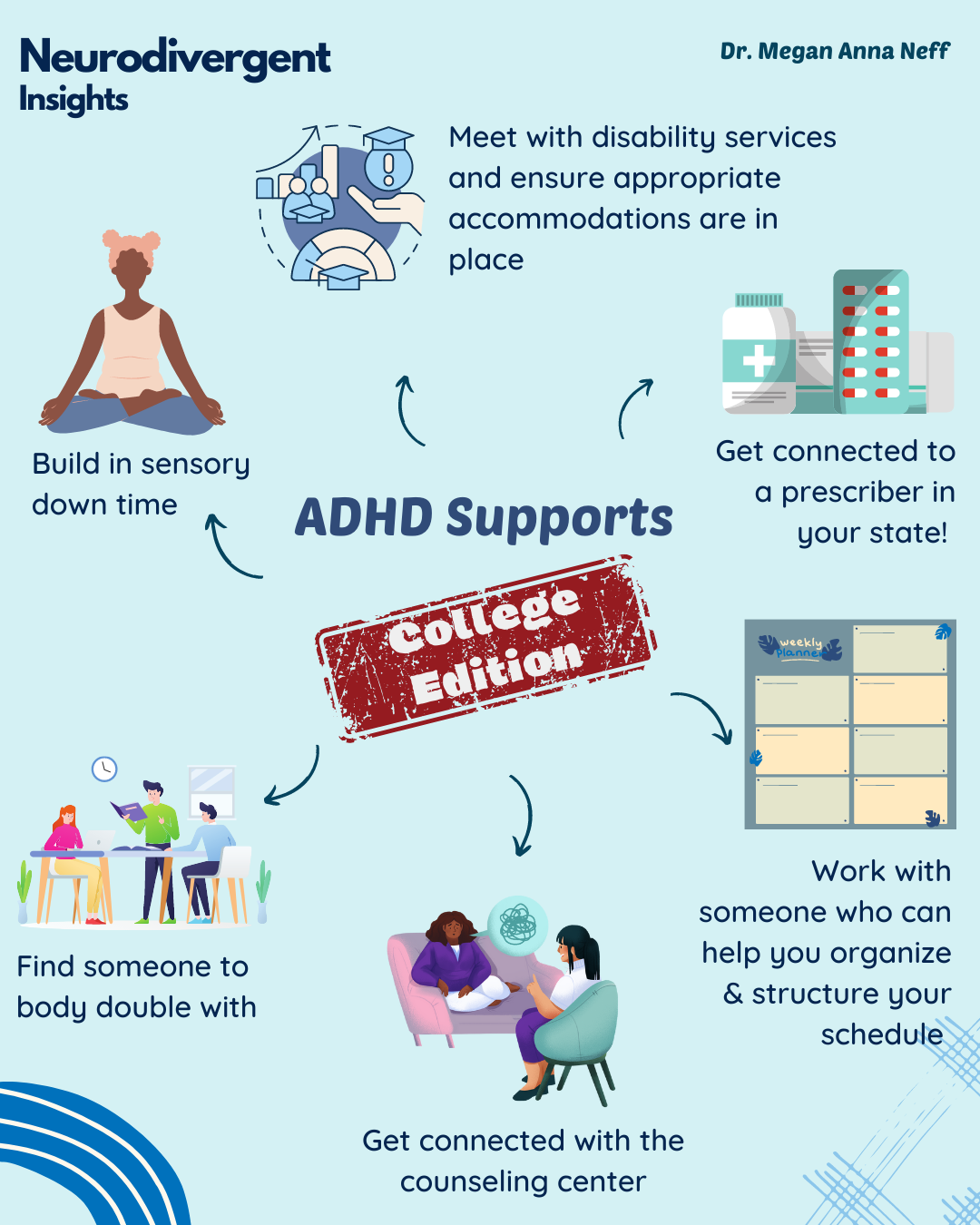
ADHDers will experience challenges unique to them. The following are specific considerations for ADHDers (scroll below to find specific recommendations for Autistic people).
Medication Management
If you are prescribed a stimulant, there can be some complexities to think through. Stimulants are classified as “controlled” substances, so you’ll want to work with your current doctor and reach out to the school to learn how to keep your prescription up to date. This is particularly important if you are moving out of state for college.
Some college health centers prescribe stimulants, while others do not. In this case (and if out of state), you will want to start early in finding a medical provider who prescribes. You don’t want to wait until your medication runs out to navigate this!
College is also a time that a person may first start ADHD medication. For many people, compensatory strategies were enough to get them through high school, but once they hit the extra demands of college, the “wheels come off,” and burnout and overload hit! For this reason, college is a common time that many high-achieving ADHDers may start medication for the first time.
If you think medication may be helpful, it is likely helpful to start this conversation earlier with your medical provider (ideally before heading off to college). Again, you want to avoid the situation where you’re in crisis mode before you seek support.
Find a Body Double
Body-doubling is a common practice used by ADHDers. Body-doubling might sound like something out of sci-fi, but it is rather simple in nature. Body doubling means doing a task in the presence of another person, and this practice is often helpful for many ADHDers.
There are a few different ways to body double. In one case, the other person may be helping with the task (for example, when cleaning a room or working on housework together). Alternatively, the other person may be working on a similar task but independently (for example, working on homework together).
The concept of body doubling came from ADHD support groups. While we don’t yet know why it specifically works, there are several theories:
It may help with motivation and task initiation
The calming presence of another person can help with focus
Can help with incentivizing boring tasks
Tips for finding a good body double
If you’re choosing the person to study with, don’t pick someone that you’re going to want to talk with the whole time
Choose someone who you feel comfortable with and who has a calming presence
Choose someone who can easily stay on task.
Consider Swapping: For tasks like cleaning and manual labor, consider swapping with a friend (for example, go over and help them clean their dorm, and then they come over the next day to help you).
Autism Specific Considerations
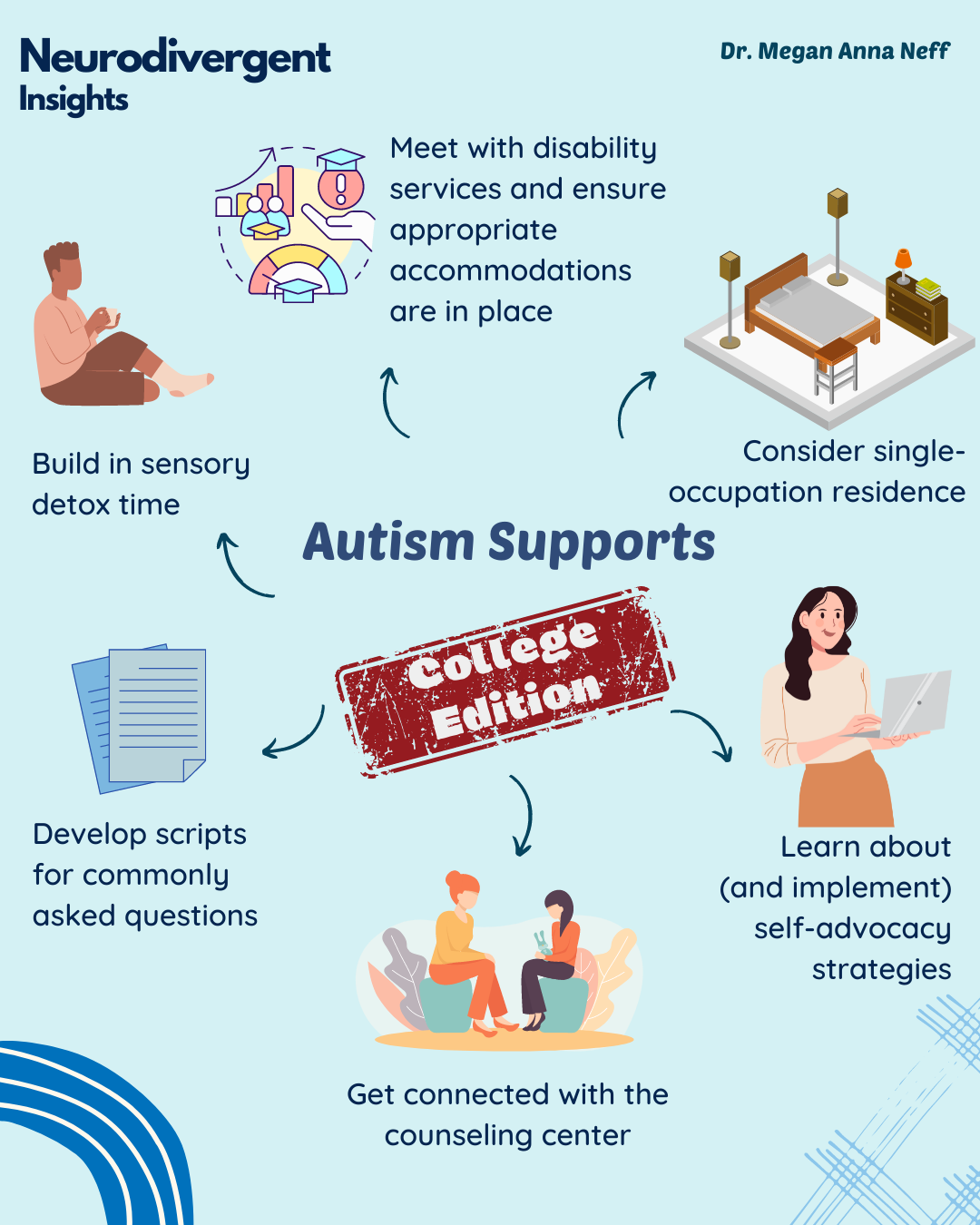 Autism Specific Supports
Autism Specific Supports
While executive functioning and academic struggles are perhaps the most poignant struggles for ADHDers, Autistic individuals tend to experience different struggles. While Autistic people are often intellectually prepared for college, they tend to struggle more with life skills and interpersonal interactions. In a study done by (White et al., 2016), they found the following areas of difficulty often led to college dropout and struggle among Autistic people:
- Difficulty with social interactions
- Managing the many competing demands of college
- Difficulty with emotional regulation
Other difficulties many Autistic people experience include difficulty with
Self-advocating
De-coding academic instructions
Executive functioning challenges
Autistic Self-Advocacy
If you’ve been around a while, you know I am passionate about the topic of self-advocacy and autism. Self-advocacy is a big word, but it can be as simple as asking your roommate to dim the lights or asking if you can sit at a different table with less light.
Many Autistic people are uncomfortable with self-advocacy, and this is part of what makes the college transition difficult. For many, their parents may have played a key role in advocating. I suspect that limited ability to self-advocate is one of the reasons Autistic people drop out of college at high rates.
One resource I like for self-advocacy is The Integrated Self-Advocacy Curriculum (ideally, it’s done with a coach or therapist, however, if you are good at self-directed learning, I believe it can be helpful as a stand-alone book).
If you’d like more of a deep dive into self-advocacy, you can read my post about it here, where I break down self-advocacy into a nice, neat equation 🙂
Managing all the Social Demands
The transition to college generally involves a big jump in the amount of time spent socializing and the demands placed on socializing. College involves A LOT OF PEOPLING. You are in classes with people; you are often doing group projects, eating in a cafeteria filled with people, and socializing between classes. This is a lot of stimulation and is particularly difficult if you do not have a place to escape for some downtime and privacy. This places a lot of demands on the Autistic person. Here are a few considerations when navigating the many social demands of college:
Consider Solo Occupation
In general, Autistic people need more alone time than allistic people. Interacting with people is a sensory demand. In college, it can be hard to find spaces to escape for some much-needed alone time. Too much peopling + limited ability to get alone time is a recipe for meltdowns, sensory overload, and burnout. Many Autistic people do well when they can have a single-occupancy dorm.
I have written letters requesting this accommodation for several of the college students I have worked with. This is absolutely an appropriate accommodation to ask for. For many Autistic people, we recharge by being alone and having a dedicated space where we can escape people, and all the sensory input that comes with that is essential for college survival.
Managing Social Differences: Social Scripts, Learning Allistic Language and More
A research study by McLeod et al (2019) highlights the discrepancy many Autistic young adults feel upon entering college. Many feel prepared for academics but underprepared in daily living/social skills activities. While many Autistic individuals still benefit from targeted accommodations (longer test-taking time etc.), it is harder to find the sorts of accommodations that many of us actually need (social support and life skills support). Generally, these are harder to quantify and can be harder for academic institutions to support.
Following are a few ideas on how to work with this vulnerability:
Develop Social Scripts for Common Interactions
First off, yes, developing social script is a form of masking. I have talked previously about how masking is a contributor to burnout. However, the reality is that living unmasked also creates stress (particularly when interacting with many new people). To mask or unmask is a personal decision (and sometimes outside of our conscious control).
Personally, having pre-prepared scripts when I am entering a new context helps reduce my anxiety and overall sensory burden. In certain situations, I save more energy by scripting (and masking) than going unmasked and dealing with the fallout.
Developing Social Scripts
When you are meeting new people at college, there are many common “ice breaker” questions such as:
Where are you from?
What are you majoring in?
What do you do for fun?
Thinking about these questions ahead of time and having a prepared response makes these situations easier to navigate for many Autistic people. Also, consider the questions you may want to ask in return. For more information on initiating a back-and-forth conversation, here are a few follow-up worksheets:
Scripting can also be helpful when you anticipate needing to communicate with a professor, such as when you need to ask a clarifying question or discuss accommodations. Practicing how to word your request ahead of time can reduce your stress and anxiety when talking with the professor (bonus, this is also a form of self-advocacy).
Consider Developing your Allistic Social Skills
Similar to the debate on masking, another hotly debated area is whether or not to do social skills training. I believe social skills training can help reduce anxiety and stress. However, I think it is vital to consider the goal of social skills training.
Social skills are NOT about learning how to communicate “appropriately” or in the “correct way.” Social skills are teaching you how to communicate with non-Autistic people. Consider this as similar to when you are learning a second language. When learning allistic social skills, you are learning the language of another cultural group. Personally, I wish “social skills training” was called “Allistic Communication Training.”
To clarify, Autistic people have social skills; they are distinct and have their own norms. Our social skills involve:
The ability to speak frankly and directly with other people without becoming flustered by the truth
A tendency to speak passionately about our area of interests
A tendency for divergent thought processes that connect and interweave ideas and discovers patterns (perhaps more common for Autistic-ADHDers)
An enjoyment of movement while talking
We don’t require eye contact to facilitate meaningful connection
A dislike of inefficient communication and preference to dive into the content of the conversation rather than spending time in transitional conversation (small talk, etc.)
Unfortunately, many social practices are interpreted as “lacking social skills” by Allistic people and can make it more difficult to integrate into predominately Allistic spaces. For this reason, I do believe some people benefit from “social skills training” (i.e., Allistic social training). When the goal is to build connections with Allistic people and to reduce the anxiety and stress that comes from negative feedback from Allistic people, social skills can be helpful.
My one word of advice: if you seek social skills training (either online through a program like UCLA Peers, through your campus, or in individual therapy), please remember that you are not learning how to communicate correctly. You are learning a second language to help you move through the world more easily.
Autistic Men, Dating and Sexual Harassment
Before leaving the topic of social skills, one more word of caution. Sadly, I have seen many Autistic cis men be accused of “sexual harassment” by allistic cis women. I believe several factors contribute to this
The tendency to want to learn as much as possible about an area of interest (including a person) can look like wanting to learn about their schedule and routine
Difficulty understanding subtle forms of communication. Many Allistic girls will decline a date by saying things like, “I can’t this Friday.” When the Autistic person misunderstands this, they may repetitively ask her out.
In such cases, specifically learning social skills around dating (how to initiate a conversation with a person of interest, how to interpret their subtle responses) can protect Autistic men from the significant emotional pain and stress of these forms of accusation.
And That’s a Wrap
Phew, this was a long post today. Thanks for sticking around. Whether you are heading off to college, supporting your kid as they transition to college, or a therapist supporting college students, I am glad you are here and doing the work to learn how to best support neurodivergent young adults.
This post was proofread by Grammarly, my go-to for proofreading and catching all the details I naturally miss! Grammarly is entirely free to use. Click here to give it a try.
This is an example product. Double-click here to search for one of your own products to display.

